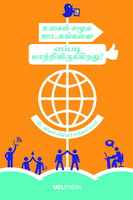உலகம் சமூக ஊடகங்களை எப்படி மாற்றியிருக்கிறது How the world changed social media (Tamil)
| dc.contributor.author | Miller, Daniel | |
| dc.contributor.author | Costa, Elisabetta | |
| dc.contributor.author | Haynes, Nell | |
| dc.contributor.author | McDonald, Tom | |
| dc.contributor.author | Nicolescu, Razvan | |
| dc.contributor.author | Sinanan, Jolynna | |
| dc.contributor.author | Spyer, Juliano | |
| dc.contributor.author | Venkatraman, Shriram | |
| dc.contributor.author | Wang, Xinyuan | |
| dc.date.accessioned | 2019-03-14 13:40:07 | |
| dc.date.accessioned | 2020-04-01T10:48:16Z | |
| dc.date.available | 2020-04-01T10:48:16Z | |
| dc.date.issued | 2019 | |
| dc.identifier | 1004331 | |
| dc.identifier | OCN: 1100490578 | en_US |
| dc.identifier.uri | http://library.oapen.org/handle/20.500.12657/25757 | |
| dc.description.abstract | How the World Changed Social Media is the first book in Why We Post, a book series that investigates the findings of anthropologists who each spent 15 months living in communities across the world. This book offers a comparative analysis summarising the results of the research and explores the impact of social media on politics and gender, education and commerce. What is the result of the increased emphasis on visual communication? Are we becoming more individual or more social? Why is public social media so conservative? Why does equality online fail to shift inequality offline? How did memes become the moral police of the internet? Supported by an introduction to the project’s academic framework and theoretical terms that help to account for the findings, the book argues that the only way to appreciate and understand something as intimate and ubiquitous as social media is to be immersed in the lives of the people who post. Only then can we discover how people all around the world have already transformed social media in such unexpected ways and assess the consequences. | |
| dc.language | Tamil | |
| dc.relation.ispartofseries | Why We Post | |
| dc.subject.classification | thema EDItEUR::G Reference, Information and Interdisciplinary subjects::GT Interdisciplinary studies::GTC Communication studies | en_US |
| dc.subject.classification | thema EDItEUR::J Society and Social Sciences::JB Society and culture: general::JBC Cultural and media studies::JBCT Media studies | en_US |
| dc.subject.classification | thema EDItEUR::J Society and Social Sciences::JH Sociology and anthropology | en_US |
| dc.subject.other | மானுடவியலாளர்கள் | |
| dc.subject.other | சமூக ஊடக | |
| dc.subject.other | மக்கள் இன அமைப்பியல் | |
| dc.subject.other | Social media | |
| dc.subject.other | Society | |
| dc.subject.other | Culture | |
| dc.subject.other | Memes | |
| dc.title | உலகம் சமூக ஊடகங்களை எப்படி மாற்றியிருக்கிறது How the world changed social media (Tamil) | |
| dc.type | book | |
| oapen.abstract.otherlanguage | ஒன்பது மானுடவியலாளர்கள் பிரேசில், சீனா, இந்தியா, துருக்கி, இங்கிலாந்து, சிலி, டிரினிடாட், இத்தாலி போன்ற ஒன்பது வெவ்வேறு சமூகங்களில் 15 மாதங்களை தங்கியிருந்து நடத்திய ஆய்வின் கண்டுபிடிப்புகளை ஆராயும் "நாம் ஏன் பதிவிடுகிறோம்" என்ற புத்தக வரிசையின் முதல் புத்தகம் தான் உலகம் சமூக ஊடகங்களை எப்படி மாற்றியிருக்கிறது என்ற இந்தப் புத்தகம். இது மேற்கூறிய ஆராய்ச்சியின் முடிவுகளை தொகுத்து வழங்கியும், அரசியல், கல்வி, பாலினம், வணிகம் ஆகியவற்றின் மீது சமூக ஊடகங்களின் தாக்கத்தைப் பற்றி ஆராய்ந்தும், ஒரு ஒப்பீட்டு ஆய்வினை வழங்குகிறது. காட்சிக்குரிய தகவல் பரிமாற்றத்தின் மீதான அதிக முக்கியத்துவத்தின் விளைவுகள் என்ன? நாம் அதிக தனிமையானவர்களாக ஆகிவருகிறோமா அல்லது அதிக சமூகமயமானவர்களாக ஆகிவருகிறோமா? பொதுநோக்கிய சமூக ஊடகங்கள் ஏன் மிகவும் பழமைவாதம் நிறைந்ததாக இருக்கிறது? நிகழ்நிலையில் உள்ள சமத்துவத்தால், இயல்புநிலையில் உள்ள சமத்துவமின்மையை ஏன் மாற்ற முடியவில்லை? மீம்கள் எப்படி இணையத்தின் மரபுக் காவலர்களாக மாறின? போன்றவை தான் அவை. | |
| oapen.identifier.doi | 10.14324/111.9781787354920 | |
| oapen.relation.isPublishedBy | df73bf94-b818-494c-a8dd-6775b0573bc2 | |
| oapen.relation.isbn | 9781787354920 | |
| oapen.pages | 424 | |
| oapen.place.publication | London | |
| oapen.identifier.ocn | 1100490578 |

